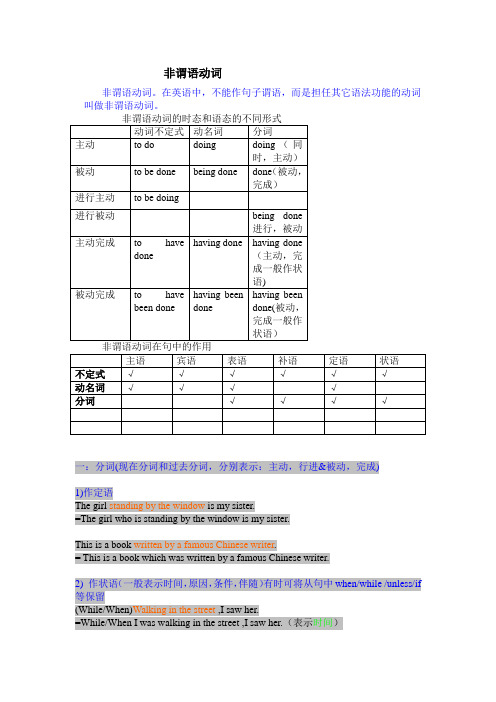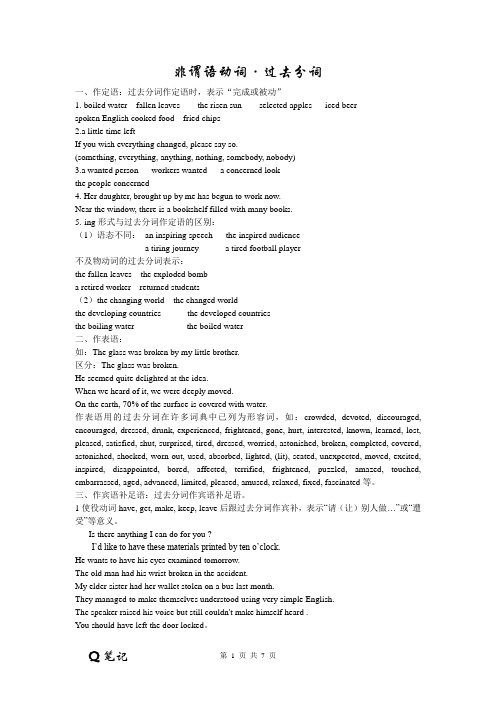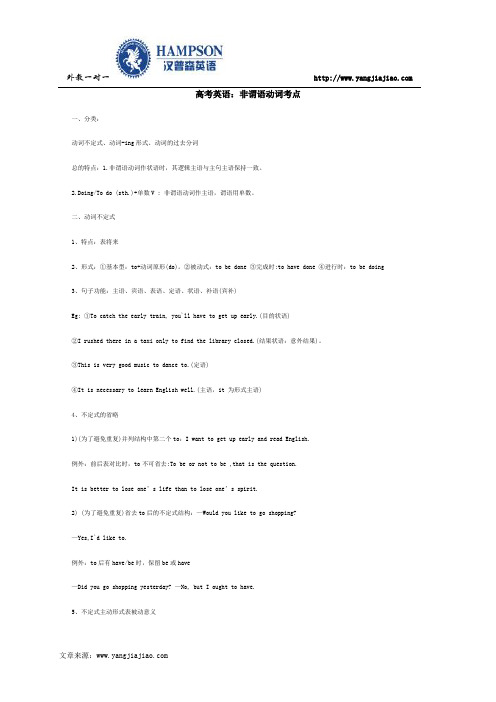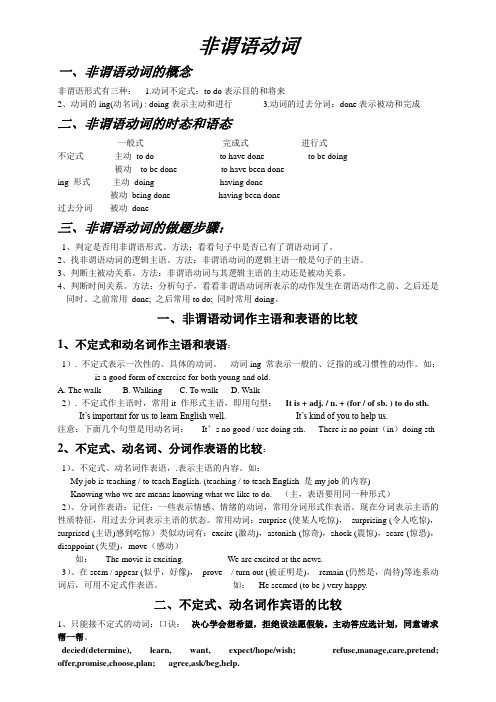高考英语语法复习十四 非谓语动词三 过去分词
- 格式:doc
- 大小:54.00 KB
- 文档页数:4

非谓语动词非谓语动词。
在英语中,不能作句子谓语,而是担任其它语法功能的动词叫做非谓语动词。
非谓语动词的时态和语态的不同形式动词不定式动名词分词主动to do doing doing(同时,主动)被动to be done being done done(被动,完成)进行主动to be doing进行被动being done进行,被动主动完成to havedone having done having done(主动,完成一般作状语)被动完成to havebeen done having beendonehaving beendone(被动,完成一般作状语)非谓语动词在句中的作用主语宾语表语补语定语状语不定式√√√√√√动名词√√√√分词√√√√一:分词(现在分词和过去分词,分别表示:主动,行进&被动,完成)1)作定语The girl standing by the window is my sister.=The girl who is standing by the window is my sister.This is a book written by a famous Chinese writer.= This is a book which was written by a famous Chinese writer.2) 作状语(一般表示时间,原因,条件,伴随)有时可将从句中when/while /unless/if 等保留(While/When)Walking in the street ,I saw her.=While/When I was walking in the street ,I saw her.(表示时间)Seen from the hill,our school looks more beautiful.=When our school is seen from the hill,it looks more beautiful.从小山上看,我们学校更美了。

非谓语动词·过去分词一、作定语:过去分词作定语时,表示“完成或被动”1. boiled water fallen leaves the risen sun selected apples iced beerspoken English cooked food fried chips2.a little time leftIf you wish everything changed, please say so.(something, everything, anything, nothing, somebody, nobody)3.a wanted person workers wanted a concerned lookthe people concerned4. Her daughter, brought up by me has begun to work now.Near the window, there is a bookshelf filled with many books.5.-ing形式与过去分词作定语的区别:(1)语态不同:an inspiring speech the inspired audiencea tiring journey a tired football player不及物动词的过去分词表示:the fallen leaves the exploded bomba retired worker returned students(2)the changing world the changed worldthe developing countries the developed countriesthe boiling water the boiled water二、作表语:如:The glass was broken by my little brother.区分:The glass was broken.He seemed quite delighted at the idea.When we heard of it, we were deeply moved.On the earth, 70% of the surface is covered with water.作表语用的过去分词在许多词典中已列为形容词,如:crowded, devoted, discouraged, encouraged, dressed, drunk, experienced, frightened, gone, hurt, interested, known, learned, lost, pleased, satisfied, shut, surprised, tired, dressed, worried, astonished, broken, completed, covered, astonished, shocked, worn out, used, absorbed, lighted, (lit), seated, unexpected, moved, excited, inspired, disappointed, bored, affected, terrified, frightened, puzzled, amazed, touched, embarrassed, aged, advanced, limited, pleased, amused, relaxed, fixed, fascinated等。

高考英语非谓语动词高三语法复习---非谓语动词经典学案讲义高三语法复习---非谓语动词非谓语动词包括不定式,动名词和分词。
它们是高中所学的基础语法,也是高考必考内容。
既是高考的难点又是高考的热点。
真正领悟非谓语动词的用法要具备以下基础知识:①具有句子结构的知识,会分析句子成分。
④具备各种复合句的知识,能够拆析复合句和长难句五种句型:1. 主+ 系+ 表We are students.2. 主语+动词(不及物)We work.3. 主语+动词(及物)+宾语He plays the piano.4.主语+动词(及物)+直接宾语+间接宾语She gave me a pen.5. 主语+动词(及物)+宾语+宾语补足语He made the boy laugh. We call him Jack We elected him chairman.(有些动词后面只能用Ving 做宾语,有些只能用不定式做宾语,有些两者皆可。
必须弄清以下常考词的搭配、意义及区别)A:不定式做宾语练习(解题技巧:记忆动词搭配, 做题事半功倍):1 To tell you the truth, I’d rather read than watch television; the programs seem _____ all the time.A. to get worseB. to be getting worseC. to have got worseD. getting worse2 I don't know whether you happen ______ it , but I'm going to study in the U.S.A. this September.A. to be heardB. to be hearingC. to hearD. to have heard3. Do let your mother know all the truth. She appears ______ everything.A.to tellB. to be toldC. to be tellingD. to have been told4 Having a trip abroad is certainly good for the old couple, but it remains ______ whether they will enjoy it. A. to see B. to be seen C. seeing D. seen5 When his father came back, the boy pretended ________his homework.A doingB to doC to doingD to be doingB 动名词做宾语练习:1 . I am busy _____ for the entrance examination, so I can’t help _____ housework at home.A. preparing; doingB. preparing; to doC. to prepare; doingD. to prepare; to do2 Whatever trouble Mr. White had ____ with the case, he would stick to his own opinion.A. dealB. to dealC. dealtD. dealing3 The woman found it no good _____ her daughter too much money.A. givingB. being givenC. givenD. gave4 Rather than ___ on a crowded bus ,he always perfers ___ a bicycle.A ride ;rideB riding ; rideC ride ; to rideD to ride ; riding5 Tony was very unhappy for ______ to the party.A. having not been invitedB. not having invitedC. having not invitedD. not having been invited6 One learns a language by making mistakes and ______ them.A. correctB. correctingC. correctsD. to correct7 I really appreciate ______ to relax with you on this nice island.A. to have had timeB. have timeC. to have timeD. having time8 Sandy could do nothing but ______ teacher that he was wrong.A. admitB. admittedC. admittingD. to admit9 Mr. Reed made up his mind to devote all he had to ______ some schools for poor children.A. set upB. setting upC. have set upD. having set up10 In order to gain a bigger share in the international market, many state-run companies are striving ______ theirproducts more competitive.A. to makeB. makingC. to have madeD. having made)11 Victor apologized for ______ to inform me of the change in the plan.A. his being not ableB. him not to be ableC. his not being ableD. him to be not able12 The first thing that probably needs _____is to ask your mother’s advice.A to doB to be doneC being doneD be done13 I had no choice but ________.A do as you tell meB to do as you told meC to do what you’ll sayD doing as you say14 Police are now searching for a woman who is reported to ______ since the flood hit the area last Friday.A have been missingB have got lostC be missingD get lost15 They look forward with hope ________ a chance to receive further education.A of gettingB to getC to gettingD in getting宾语补足语的区别:练习:(解题技巧:记固定搭配,辩逻辑关系)A 固定句型sb/sth be said/believed/ reported/ considered/ thought to do /to be doing /to have done 要分清练习:1 Linda is thought to_____ in Africa, but I really don’t know what country she’s working in.A. have workedB. workC. be workingD. be worked2 Robert is said _____ abroad ,but I don’t know what country he studied in.A to have studiedB to studyC to be studyingD to have been studying3 The flu is believed ______ by viruses that like to reproduce in the cells inside the human nose and throat.A. causingB. being causedC. to be causedD. to have caused4 John Bell was generally considered ________ the first telephone.A inventingB to inventC having inventedD to have invented.B 弄清以下搭配及其意义1.感官动词see, watch, observe, hear, listen to, notice等后面的宾补有3种形式(do/doing/done),doing表主动或正在进行,done表被动或完成,do表主动和完成(被动句中to 还原)。

外教一对一高考英语:非谓语动词考点一、分类:动词不定式、动词-ing形式、动词的过去分词总的特点:1.非谓语动词作状语时,其逻辑主语与主句主语保持一致。
2.Doing/To do (sth.)+单数V : 非谓语动词作主语,谓语用单数。
二、动词不定式1、特点:表将来2、形式:①基本型:to+动词原形(do)。
②被动式:to be done ③完成时:to have done ④进行时:to be doing3、句子功能:主语、宾语、表语、定语、状语、补语(宾补)Eg: ①To catch the early train, you`ll have to get up early.(目的状语)②I rushed there in a taxi only to find the library closed.(结果状语:意外结果)。
③This i s very good music to dance to.(定语)④It is necessary to learn English well.(主语,it 为形式主语)4、不定式的省略1)(为了避免重复)并列结构中第二个to:I want to get up early and read English.例外:前后表对比时,to不可省去:To be or not to be ,that is the question.It is better to lose one’s life than to lose one’s spirit.2) (为了避免重复)省去to后的不定式结构:—Would you like to go shopping?—Yes,I`d like to.例外:to后有have/be时,保留be或have—Did you go shopping yesterday? —No, but I ought to have.5、不定式主动形式表被动意义外教一对一1)主(sth)+ be + 主补/表语(表性质的adj. + to do)2) 主+Vt + 宾语 + 宾补(adj.+ to do)3) 主 + Vt+ 宾语+定语(to do): 不定式作定语与所修饰的名词(代词)构成逻辑动宾关系,又和该句主语构成逻辑上的主谓关系。

七、非谓语动词非谓语动词的语法功能注:现在分词、不定式、过去分词都可以作独立成分generally speaking一般说来;frankly speaking坦白地说;judging from/by...根据……来判断;considering.../taking...into consideration考虑到……;to tell you the truth说实话;seeing...考虑到……;supposing假设,如果;providing如果;given考虑到,鉴于;provided that如果非谓语动词的形式变化在解非谓语习题时同学们遇到最大的困难有两个:一是如何判别是谓语动词还是非谓语动词;二是如何选用哪一种非谓语动词及其恰当的形式。
一、谓语与非谓语的比较非谓语动词是汉语中没有的语言现象。
汉语中几个谓语动词连用而动词不用作任何形式的变化。
如:他明天来拜访你。
翻译成英语不是He will come visit you,而是He will come to visit you.这里就用了不定式to visit。
因此同学们要特别注意弄清句子的结构。
例:Tom sat under a tree and seeing his friend, up in no time.A. to standB. standingC. stoodD. would stand分析:stood是与sat并列的谓语。
非谓语语法功能的比较做宾语的非谓语动词比较非谓语动词做宾语补足语的区别IV. 非谓语动词做定语的区别注意:the bridge to be built 将建造的桥, the bridge being built 正在建造的桥,the bridge built已经建好的桥。

非谓语动词一、非谓语动词的概念非谓语形式有三种: 1.动词不定式:to do表示目的和将来2、动词的ing(动名词) : doing表示主动和进行 3.动词的过去分词:done表示被动和完成二、非谓语动词的时态和语态一般式完成式进行式不定式主动to do to have done to be doing被动to be done to have been doneing 形式主动doing having done被动being done having been done过去分词被动done三、非谓语动词的做题步骤:1、判定是否用非谓语形式。
方法:看看句子中是否已有了谓语动词了。
2、找非谓语动词的逻辑主语。
方法:非谓语动词的逻辑主语一般是句子的主语。
3、判断主被动关系。
方法:非谓语动词与其逻辑主语的主动还是被动关系。
4、判断时间关系。
方法:分析句子,看看非谓语动词所表示的动作发生在谓语动作之前、之后还是同时。
之前常用done; 之后常用to do; 同时常用doing。
一、非谓语动词作主语和表语的比较1、不定式和动名词作主语和表语:1). 不定式表示一次性的、具体的动词。
动词ing 常表示一般的、泛指的或习惯性的动作。
如:________ is a good form of exercise for both young and old.A. The walkB. WalkingC. To walkD. Walk2). 不定式作主语时,常用it 作形式主语,即用句型:It is + adj. / n. + (for / of sb. ) to do sth.It’s important for us to learn English well. It’s kind of you to help us.注意:下面几个句型是用动名词:It’s no good / use doing sth. There is no point(in)doing sth2、不定式、动名词、分词作表语的比较:1)、不定式、动名词作表语,.表示主语的内容。
非谓语动词非谓语动词是高考的重点和热点,非谓语动词分为三种形式:不定式,V-ing分词(又分为现在分词和动名词)和过去分词。
注:常见作独立成分的非谓语动词to tell you the truth(实话说),needless to say(不用说),to be honest/frank(老实说,坦白说),to be more exact(更确切地说),to make things worse (更糟的是),not to mention…(更不用说),Generally / Frankly / Roughly speaking (一般说来 / 坦白说 / 粗略地说)(一)辨别谓语与非谓语特别注意分析句子的结构才能辨别谓语与非谓语。
①The traffic rule says young children under the age of four and __ less than 40 poundsmust be in a child safety seat.A. being weighedB. weighsC. weighedD. weighing【解析】容易误选B或C,将其当成谓语看待。
under the age of four and ____ less than40 pounds用作children的定语。
动词weigh与名词children是主动关系,所以选择weighing。
②______ blood if you can and many lives will be saved.A. GivingB. GiveC. GivenD. To give【解析】如果不注意分析句子结构,会误选A或C项。
这是祈使句+and+陈述句的句型。
答案B。
(二)非谓语作主语、宾语的重点1.it充当动词不定式的形式主语或形式宾语①It is important for us to learn English very well.对我们来说学好英语是非常重要的。
2014年高考一轮复习:非谓语动词—过去分词精讲一、过去分词(The Past Participle)知识清理:1.过去分词是非谓语动词的一种,从名称来理解,就是“不能够作谓语的动词”。
所以,我们可以说,过去分词有动词的部分性质,但是又不能够独立的做谓语。
2.规则动词的过去分词由动词原形加词尾-ed构成。
不规则动词的过去分词没有统一的构成规则。
过去分词一般表示完成的和被动的动作。
3.过去分词在句中可以用作定语、表语、宾语补足语、插入语和状语,但不能单独构成谓语。
二、过去分词的用法:(一)作定语:1. 单个分词作定语,分词前置。
a broken window 破了的窗户the lost time 逝去的时间newly invented machine 新被发明的机器a retired worker 退休的工人2. 分词短语作定语,分词后置;分词修饰不定代词something等要后置;个别分词如:given, left等作定语也后置。
E.g. This is the question given.The building built last year is our library.3.①过去分词作定语与春修饰的词是被动关系,相当于一个被动高不成低不就的定语从句。
E.g. lost time——time which is losta beaten team ——a team which is beaten.a well-known writer——a writer who is well known.②部分vi动词的过去分词作定语时可以改为动词完成式或表示状态的定语从句,vi不能表示被动的意义,只能表示主动的完成意义,因此不能像vt的过去分词那样放在名词后。
E.g. a retired soldier——a soldier who has returned.retired workers——workers who have retired.a sunk ship——a ship which has sunk.①在语态上doing表示“主动”,表示它所修饰的人或物的行为。
高中英语语法专题复习03 非谓语动词(不定式、动名词&现在分词、过去分词)非谓语动词谓语动词在句子中有三种作用:1. 表示动作的时间,tense (时)2. 表示动作的状态,aspect (体)3. 表示动作的语气,mood (气)谓语动词的“时体气”,通过动词变位实现。
例如,The rabbit ate a carrot.The rabbit is eating a carrot.The rabbit has eaten a carrot.谓语动词在句子中受到主语的限制,随之出现了时态和人称的变化,成为一种被限定了的动词,所以也被称为限定性动词(finite verb)。
与之相对的,不受主语限制的动词,称为非限定性动词(non-finite verb),也就是非谓语动词。
非谓语动词不具备表达时态和人称的作用。
例如,I like to eat carrot.I liked eating carrot.The rabbit likes minced carrot.非谓语动词有四种形式:1. 不定式 infinitive2. 动名词 gerund3. 现在分词 present participle4. 过去分词 past participle谓语动词是简单句的核心动词,非谓语动词只可能出现在其他的句子成分中。
1. 主语例:Swimming makes us hale and hearty.2. 宾语例:Janet suddenly stopped talking.3. 表语/主语补语例:Her wish is to become a doctor in the future.4. 宾语补语例:I invited him to come here.5. 定语例:Don't disturb the sleeping dog.6. 状语例:He went to the supermarket to buy a pen.不定式、动名词句子的核心动词只能由谓语动词充当,而非谓语动词可以充当句子的其他成分。
高考英语中的非谓语动词一、什么是非谓语动词?1. “非谓语非谓语”, 就是不能做谓语的动词谓语:说明主语所做的动作或具有的特征和状态。
它有人称、数、时态和语态的变化。
e.g. He works. He will go to Shanghai. You looked smart.非谓语:无人称,数的变化,不单独作谓语,但保留动词特点,可以有宾语或状语。
Climbing mountains is great fun. To visit China is my next goal.非谓语动词包括:1)不定式to + v 2)动词v-ing 3)过去分词v-ed2.非谓语使用条件一个句子当中,已经存在一个主句(谓语动词),又没有连词的情况下She got off the bus, but left her handbag on her seat. She got off the bus, leaving her handbag on her seat.3.构成形式4.用法二、用法比较(一).不定式和-ing形式作主语的区别1. -ing和不定式都可以作主语,-ing作主语表示一般或抽象的经常性,习惯性行为,不定式作主语往往表示具体的或一次性的动作。
Learning a foreign language is very useful.It is not very good for you to smoke so much.2..---不定式做主语,一般用it当形式主语,把作主语的不定式短语后置。
常见句型有it is adj. (of/for sb.) to do sth.(1)It’s difficult (important, necessary) for sb. to do (2)It’s kind (good, friendly, polite, careless, rude, cruel, clever, foolish, brave) of sb. to do.3..-ing在“It is no use/ no good/useless + doing”结构中作主语,it为形式主语。
高考英语语法复习十四非谓语动词三过去分词(三)过去分词:1、过去分词的基本用法:过去分词只有一种形式,也没有主动语态,它所表示的动作是一个被动的或是已完成的动作。
过去分词在句中也可用作定语、表语、宾语或状语等成分。
过去分词在句中作某种成分时,其逻辑主语一般为该分词所表示的动作的承受者,如:(1)作定语:过去分词作定语时,如果这个分词是一个单词,就位于其修饰的名词之前,如果是分词短语,就位于其修饰的名词之后。
被过去分词所修饰的名词,就是该分词的逻辑主语,如:The stolen car was found by the police last week.(2)作表语:过去分词作表语时,表示其逻辑主语所处的状态,其逻辑主语就是句中的主语,如:The glass is broken.这个玻璃杯是破的。
注:过去分词作表语时,和动词的被动语态结构相似,但两者表达的意义不同,如:The glass was broken by my little brother.这个玻璃杯是被我小弟弟打破的。
作表语用的过去分词在许多词典中已列为形容词,如:crowded, devoted, discouraged, done, dressed, drunk, experienced, frightened, gone, hurt, interested, killed, known, learned, lost, pleased, satisfied, shut, surprised, tired, undressed, worried, astonished, broken, completed, covered等。
(3)作宾语补足语:过去分词作宾语补足语时,句中的宾语就是其逻辑主语,如:When I opened the door, I found the ground covered by fallen leaves. 注:动词have后的复合宾语中,宾语补足语如为过去分词,常表示该分词所表示的动作是由别人来执行的而不是句中主语自己来执行的,如:I had my bike repaired yesterday. 昨天我(找别人)把我的自行车给修了。
(4)作状语:过去分词作状语时,相当于一个状语从句,该结构的逻辑主语一般都是主句的主语,是过去分词所表示意义的逻辑宾语。
为了使作状语的过去分词意义更加明确,常在分词前加when, if, while, though, as等连词,如:Seen from the hill/ When seen from the hill, our town looks beautiful.; Given more time/ If given more time, we could have done it better.(we是该结构的逻辑主语,是give的逻辑宾语。
)独立主格:上述-ing和过去分词的用法中,-ing和过去分词在句中均有逻辑主语,但有时它们也能有自己的独立的主语,这种独立的主语,一般为名词或代词,位于其前之前,和-ing 或过去分词构成独立主格。
独立主格在句中一般只作状语用,而-ing和过去分词作用的形式,则要根据它们所表示的动作和句中谓语动词所表示的时间关系而定。
至于独立主格中是使用-ing或是过去分词,则要根据它们的主语和其所表示的动作的主动被动关系而定,如:The bell ringing, we all stopped talking. 注:The work having been finished, she sat down to have a rest. ①独立结构中的being或having been常可省去,如:The meeting (being) over, all left the room. ②作伴随状语的独立结构常可用with短语来代替,如:She read the letter, tears rolling down her cheeks./ She read the letter with tears rolling down her cheeks.2、-ing形式与过去分词的区别:(1)语态不同:-ing形式表示主动概念,及物动词的过去分词表示被动概念。
an inspiring speech鼓舞人心的演说;the inspired audience受鼓舞的听众。
(2)时间关系不同:现在分词所表示的动作一般是正在进行中的动作,而过去分词所表示的动作,往往是已经完成的动作,如:The changing world正在发生的世界;the changed world 已经起了变化的世界。
练习、非谓语动词(三)1. There is no question of _____ able to finish it himself.A. Tom wasB. Tom's beingC. Tom's beD. Tom is2. The new shopping center _____ now will be put into use by the end of this year.A. builtB. be builtC. being builtD. to be built3. "Have you had supper?" "Not yet. The meal_____."A. are being cookedB. is being cookedC. is cookedD. are cooked4. "I'm glad ______ you here in the hotel." "It's my great pleasure to have you ______ us."A. meeting, toB. to have met, withC. having met, amongD. to meet, of5. I'm afraid I can't make myself _____ in English.A. understandingB. understandC. to be understoodD. understood6. Although in a hurry, Wilson ______.A. couldn't stop walkingB. couldn't help the strangerC. stopped to help the strangerD. didn't answer the stranger7. Janet is easy _____.A. for getting along withB. by getting along withC. to get along withD. got along with8. Don't forget ______ the light when you leave.A. turn offB. to turn offC. turning offD. turned off9. The mother is very glad; her baby is beginning ______.A. understanding what she meansB. to understand that she meantC. to understand what she meansD. noticing what she means ,10. I think this story is _____ .A. worth being readB. worth readingC. worth to readD. worth of reading11. This scientist is a man ______ praise.A. worth toB. worthy to beC. worthy ofD. worth12. I don't want ______ any more trouble, you see?A. there beingB. it to beC. it beingD. there to be13. When she returned home, she found the window open and something ______.A. stealingB. missedC. stolenD. to steal14. Strictly _____, it isn't worth the price you are asking.A. to speakB. speakingC. speakD. spoken15. Time ______, they'll come here to watch us ______ football.A. permitted, playingB. permitted, to playC. permitting, playD. permitting, to play16. The man was seen _____ into the courtyard.A, stealing B. stolen C. be stealing D. had stolen 17. Bob should love _____ to the party tomorrow evening.A. takingB. to be takenC. to takeD. being taken18. Tom had no choice but _____ the classroom with his classmates.A. to cleanB. cleanC. cleaningD. cleans19. Mr. Brown said that his car neededA. to be repairedB. being repairedC. be repairingD. to repair20. The old man didn't know whether to sell the car or____ .A. being kept for later useB. kept for later useC. to keep it for later useD. to be kept it for later use21. The noise of the desks _____ could be heard in the next classroom.A. being opened and closedB. opened and closedC. having been opened and closedD. to be opened and closed22. I remember _____ someone ____ the umbrella away.A. to see, takeB. having seen, to takeC. to see, to takeD. having seen, take23. She was noticed ______ the shop.A. to enterB. enterC. having enteredD. entered24. I couldn't help _____ when I heard the joke.A. being laughedB. laughingC. to be laughingD. to laugh25._____, she burst into tears.A. Deeply movedB. Deeply movingC. As she deeply movedD. As she was deeply moving26. The problem requires ______.A. studying with great careB. to study carefullyC. to be studied without carelessnessD. taking great care of studying it27. _____ carelessly, the boy made mistakes here and there. .A. being writtenB. WroteC. WriteD. Writing28. He would rather ______ his parents with their housework than _____ out to play games.A. to help, to goB. help, goC. help, to goD. to help, go29. The boy had his leg _____ while ____ football.A. broken, playingB. break, playC. broken, playedD. broke, was playing30. Having finished the work,_____. A. it was almost six o'clockB. a postman came and delivered the evening paper and some lettersC. supper had been already preparedD. we had a rest and then had supper31. He is ill. He has kept_____.A. coughing all alongB. to cough at nightC. cough since yesterdayD. being coughed day and night32. It is no use ____ without _____.A. to talk, doingB. taking, being doneC. talking, doingD. being talked, being to do33. "I usually go there by boat." "Why not _____ by train for a change?"A. try goingB. to try goingC. trying to goD. to try and go34._____, she felt quite shy at the party.A. As she a strangerB. Being a strangerC. According to a strangerD. She like a stranger35. Every morning he gets up early and practises ______ and then _____ to school.A. to read English, goB. reading English, goingC. reading English, goesD. of reading English, goes36. While _____ football on tin playground, I found 'my keys ______.A. playing, lost ,B. play, losingC. played, being lostD. having played, lost37. ____ the same mistakes again made his parents very angry.A. His having madeB. He has madeC. He had makingD. Him making38. Dick made it ______ to all his friends.A. to knowB. knownC. knowD. knowing39. Anna spends one hour a day _____ spoken English.A. practiseB. to practiseC. on practisingD. in practising40. No one was surprised at _____ the examination.A. he passingB. his passC. him passD. his passing41. Although swimming is his favourite sport, yet he doesn't like _____ today.A. to swimB. swimmingC. swimD. to have swim42. She sat at the desk and set about _____ a letter to her friend.A. to writeB. writingC. writeD. written43. This soup is cold; it needs _____.A. to heatB. to be heatedC. being hotD. heated44. I went ______a balloon but I didn't see anyone _____ balloons.A. to buy, to sellB. to buy, sellingC. buying, sellingD. buying, to sell45. Anna is often heard ______songs in her room.A. sungB. singingC. singD. to sing46. The more you practise ______ English, the better your _____ English will be.A. to speak, speakingB. speaking, spokenC. spoken, spokenD. spoken, speaking。